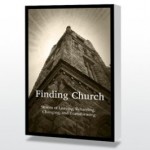They have rejected me from being king over them
Doug has written a very good post called “give us a king.” If you’re not familiar with Doug, he wrote a guest post for me last year called “Guest Blogger: Not salary but support,” and he completed his first half marathon around the same time that I completed my first half marathon (see his post “My 1st Half Marathon“). (I even interviewed Doug about running on my running blog: “Interview with Doug who recently started running.”)
This post probably caught my attention because we are studying through 1 Samuel right now. That book is amazing in it’s contrast between obedience and disobedience, trusting God and trusting something/someone else.
Here is a small part of Doug’s post:
The people were firmly warned that they should NOT look toward a ruler to set things straight in the land. Non-the-less the people got what they wanted – a king. Now that Saul was set in place all would go well. This guy looked the part and would surely have all the answers. But things didn’t go that way at all.
What they should have done is the same thing that we as Christians should do. We should consider Jesus our King. His body should be modeling, explaining, and demonstrating the principles of His kingdom. Only He can solve racial problems. Jesus alone is true and faithful.
I’m not sure why Doug focused on “racial problems” in that last paragraph (I asked him on his blog). In fact, only Jesus can solve any real kingdom problem.
Interestingly, when God told Samuel to appoint Saul as king over Israel, he also told them that they were not “getting off the hook.” What do I mean? Regardless of what the king did or did not do, the people (including the king) were still to trust God and God alone.
I think this lesson is important in politics, yes. But, it’s important in so many other areas of life as well.
But how do I return to church?
This post is part of a short series based on Jeremy Myer’s (from “Till He Comes“) book project “Finding Church.” Jeremy asked for contributions in the categories of Changing Church, Leaving Church, Reforming Church, and Returning to Church. As I worked through my own contribution, I realized that my story could fit into any of the categories. So, I’m writing a post based on each category.
This post describes my experience “returning to church.” This is the hardest category for me to write about, because my story fits into this category less than the others. This is how Jeremy describes the category of “Returning to Church”: “These are stories of people who returned to church after years of being away.”
Why is it difficult to fit my own journey into this category? Well, as I wrote in the other posts (“changing churches,” “leaving church,” and “reforming the church“), I have left the idea of church as organization, institution, or hierarchy – I’ve left any “church” other than church as God’s people gathered together. I am not returning to this kind of “church.”
Also, as I explained in the other posts, when I was saved by Jesus Christ, welcomed into God’s family, and indwelled by the Holy Spirit, I became part of the church that is the gathering of God’s people, the body of Christ, the temple of the Holy Spirit. I cannot leave this church, which means that I cannot return to this church either.
So, how is “returning” part of my journey at all? Well, there is one way…
While I am not returning to the organizations and institutions that are often referred to as “church,” I can return to the believers who remain part of those organizations. As I’ve written previously, these believers are my brothers and sisters in Christ just as much as those who are not part of the organizations and institutions. When I share my life with “one another,” that must include them, or I am the one being divisive.
Of course, there’s always the chance that those brothers and sisters in Christ will not want anything to do with me. They may not want to fellowship with me. They may decide to separate from me. There is nothing that I can do about that. Instead, it must be my desire to fellowship with them and live in peace with them. And, I must be ready and willing to “return” to them at any point they may be ready. Or, if I find that I have been the one separating from them, then I must be willing to humble myself, admit my own divisiveness, and “return” to them.
All who are in Christ are part of the family of God together. We are all part of the body of Christ. We are all indwelled by the Holy Spirit. Too many things historically, culturally, organizationally, etc. separate us from one another. It’s time to “return” to one another and, as Paul wrote, be “eager to maintain the unity of the Spirit.” (Ephesians 4:3 ESV)
Let’s return to our brothers and sisters in Christ… all of them.
Love your enemies… an ideal or a way of life?
Thanks to Robert from “Abnormal Anabaptist” for pointing out the story of Dirk Willems in his post “This Day In History: Love Your Enemy.”
Robert’s post points us to an article called “Compassion for the Enemy.” It includes a small part of the story of Dirk Willems who was burned to death in 1569.
Willems escaped from a palace where he had been imprisoned. The quote below tells what happened after a guard spotted him:
Seeing him escape, a palace guard pursued him as he fled. Dirk crossed the thin ice of a pond, the “Hondegat,” safely. His own weight had been reduced by short prison rations, but the heavier pursuer broke through.
Hearing the guard’s cries for help, Dirk turned back and rescued him. The less-than-grateful guard then seized Dirk and led him back to captivity. This time the authorities threw him into a more secure prison, a small, heavily barred room at the top of a very tall church tower, above the bell, where he was probably locked into the wooden leg stocks that remain in place today. Soon he was led out to be burned to death.
Yes, for Willems, “Love your enemy” was more than an ideal; it was a way of life in Jesus Christ.
Thanks, Robert!
Reforming the church… Reforming us all together
This post is part of a short series based on Jeremy Myer’s (from “Till He Comes“) book project “Finding Church.” Jeremy asked for contributions in the categories of Changing Church, Leaving Church, Reforming Church, and Returning to Church. As I worked through my own contribution, I realized that my story could fit into any of the categories. So, I’m writing a post based on each category.
This post describes my experience “reforming church.” This is the topic that I wrote about, and perhaps Jeremy will decide to use my submission. (This post is not my submission, but some thoughts about this topic.) This is how Jeremy describes this category: “Though many people have painful experiences in church, some people choose to stay at their church and try to work through them, reforming the church from the inside, and being the change they want to see. These are their stories.”
As usual, I have to put my own spin on this topic. As I’ve already explained in my previous two posts in this series (“changing church” and “leaving church“), church is not a building, or organization, or event, or hierarchical leadership. Church is the people of God – the body of Christ – the temple of the Holy Spirit – gathered together.
So, did I write about this topic because it is my goal to reform organizations or institutions? Absolutely not. Like I said, those things are not the church. If the organizations change to better facilitate the church (the people) involved, that’s fine. But that’s not my purpose, and it’s not the type of reform that I’m interested in.
What can of reform am I interested in? The kind of reform that Paul writes about in Ephesians 4 when he says that the entire body of Christ works together so that the body builds itself up in love – this is reforming the church. It’s the kind of reform that he also wrote about in Colossians 3 when he said that as we all teach and admonish one another as the word of Christ dwells in us all – this is reforming the church.
I’m interested in the kind of reform that Peter wrote about in 1 Peter 4 when he says that we speak to one another and serve one another in order to glorify God – this is reforming the church. I’m talking about the kind of reform that we read about in Hebrews 10 when the author exhorts his readers to consider how to stir up love and good works in one another – this is reforming the church.
This kind of reform is a mutual work as God works through each of his children to help each other grow and mature and love and hope and trust and serve and speak. This is the kind of mutual church reform I’m interested in.
Have you experienced this kind of church reform?
Preparation, Spontaneity, and the Work of the Spirit when we Gather
Eric at “A Pilgrim’s Progress” has been writing a lot of good, thought-provoking posts lately. I really enjoyed his post called “We Really Can Trust the Holy Spirit.” His post is about the work of the Holy Spirit when we are gathered together with other believers – whether it is a gathering that was planned or unplanned.
There is often disagreement among the church today about what role “preparation” and “spontaneity” should play when we gather together. Should we plan what we are going to say (i.e., “when you come together, each one has a hymn, an instruction, a revelation, a tongue, an interpretation”)? Or do we speak when the Spirit spontaneously directs us to speak (i.e., “and if the Spirit reveals something to someone sitting…”)? Both passages that I paraphrased are in the same context in 1 Corinthians 14:26-40. So, both preparation and spontaneity seem to be in view in Paul’s instructions.
This is what Eric says:
I’ve found that the Spirit tends to use our planning/preparation in the gatherings, but this may be in ways that we could not predict. For example, I plan to study over a passage of scripture tonight. I may mention it tomorrow or I may not. I really don’t know. The Spirit will make it clear to me tomorrow whether or not I should speak about it.
It is fascinating the way the Spirit frequently brings things together as Christians gather. It happens time after time in our small fellowship. One person will read a passage that relates exactly to what someone else is going through in life. We might sing a song that has a connection to what someone else is dealing with. The list goes on and on.
So, do we prepare before we gather with other believers? Sure. Do we expect and depend on the work of the Spirit when we gather together? Yes. (Although, I do think there is a problem when someone studies ONLY to have something to say when the church gathers.)
Like Eric said above, as the Spirit guides us outside of our times together, he can also guide us during our times together. We may come together with other believers expecting (and even prepared) to say something or teach something, but that may not be what God has planned. So, we trust him to know when to speak as well as what to speak.
Like Eric said, we really can trust the Holy Spirit.
When I left the church for good…
This post is part of a short series based on Jeremy Myer’s (from “Till He Comes“) book project “Finding Church.” Jeremy asked for contributions in the categories of Changing Church, Leaving Church, Reforming Church, and Returning to Church. As I worked through my own contribution, I realized that my story could fit into any of the categories. So, I’m writing a post based on each category.
This post describes when I “left church.” This is how Jeremy describes this category: “These are stories of people who felt that ‘going to church’ was inhibiting their walk with Jesus, and so left the institutional church to follow and serve Jesus in other ways.”
Of course, I already told most of this story in my previous post about “changing church.” But, in this post, I’m able to point out what I’ve “left.” Because, as I explained in that previous post, I didn’t leave the church – it’s impossible to leave the church that God is putting together once he places someone among his family.
However, I did leave “the church” – that organizational, institutional, locational version. This is the entity or location that people refer to when they ask questions like, “Where do you go to church?” or “What did you do in church today?” or “Have you joined our church yet?”
I’ve left the programs and the hierarchies and the vocations and the positions and offices.
The church is not a place that someone can go to, nor is it an event that someone can attend, nor is it an organization that someone can choose to join or not.
The church is the family of God, the body of Christ, the dwelling place of the Holy Spirit. I’m still part of that church, and I always will be. If you are in Christ, then you are part of that church with me.
It’s the other “church” that I left. And, guess what? There are people who remain part of that “church” who are also part of the church with me. Even if they never leave “the church,” they remain part of the church of God by identity, in the same way that I’ve always been part of that church and will always be part of that church.
So, I’ve left “the church.” But, in a way, my heart remains tied (through mutual relationship with God) to the hearts of those who are still part of “the church” – in the same way that my heart is tied to all who are part of God’s family.
Want to relate as church instead of organization? Don’t forget these hurdles…
Felicity at “Simply Church” has written a great post called “10 hurdles to overcome in making the transition from legacy to simple church.” Her post is a reminder to those who are interested in seeing church shift from organization-based to relational-based in our mutual relationship with God through Jesus Christ.
I’m guessing that Felicity has had some of the same conversations that I’ve had. I’ve talked with many followers of Jesus Christ – both those who find themselves in “church leadership” and those who do not – who are interested in living as the church as demonstrated in Scripture. But, there are hurdles to overcome, even for those who want to see this kind of change.
Here are a few of the hurdles that Felicity mentions:
2. People are scared they will lose the friendships and sense of community that’s been created over the years.
3. People are used to a professional standard of church: a worship band, well-prepared sermon etc.
7. How can you prevent heresy?
Felicity lists other “hurdles” on her site. Make sure you check them out.
The transition is not an easy one, even for people who love God and one another, and for people who seek to gather in ways that allow them to encourage one another and help one another grow in maturity in Christ. The transition is especially difficult when the people have only been taught one way to gather as the church and have never experiences anything different.
Be patient with yourself, with others, and with God as he worked through all of you together.
When I changed churches…
This post is part of a short series based on Jeremy Myer’s (from “Till He Comes“) book project “Finding Church.” Jeremy asked for contributions in the categories of Changing Church, Leaving Church, Reforming Church, and Returning to Church. As I worked through my own contribution, I realized that my story could fit into any of the categories. So, I’m writing a post based on each category.
This post describes when I “changed church.” This is how Jeremy describes this category: “These are stories of people who, for numerous different reasons, left one church to join another.”
Now, I grew up as part of various different “churches.” In reality, each of these was a organization, not the church. Don’t misunderstand me… the church was there – the people of God were present – but what I understood as “church” was actually the organization, not the people.
During that time, I “changed churches” many times and for different reasons. Usually, we “changed churches” because we moved. Only a few times we “changed churches” even though we stayed in the same city. Interestingly, we never “changed churches” because of problems with leadership.
In reality, I was really changing organizations. I was leaving one organization to be part of another organization. Of course, I was also breaking relationships with part of God’s family and inserting myself and my family into the lives of other people who are part of God’s family. But, I didn’t really see either one was the church.
But, a few years ago, I changed “church” for the last time. Why? Because my understanding of what the church is changed. It’s not an organization that can be joined or left. Church is the people of God, saved by faith in Jesus Christ, indwelled by the Holy Spirit, and gathered together by God according to his grace and purposes.
When I’m with the people of God, I’m part of the church with them. And, in fact, we are members together of the body of Christ whether we realize it or accept it or not. Our relationship with one another and our identity as the church of God does not depend upon our decision. Instead, it depends completely on God. We simply interact with one another as directed by the Spirit to help one another grow and mature in our walk with Jesus Christ.
So, a few years ago, I changed to a different church for the last time. I changed from “church” as an organization to church as the people of God. Actually, I have always been part of this church, even though I didn’t understand it. And, I will always be part of that church.
What about you? Have you changed churches?
Finding Church: the book project and the blog series
Jeremy at “Till He Comes” is putting together a book project called “Finding Church.” The subtitle of the book is “Stories of Leaving, Returning, Changing, and Transforming.” Last week, Jeremy provided a list of contributors in his post “Finding Church Contributors.”
In his post, Jeremy lists the contributors in each of four categories: Changing Church, Leaving Church, Reforming Church, and Returning to Church. I’m currently listed under all of those lists in the nefarious category of “Not Sent in the Story (but said they will!!!).” My story is complete and is on its way to Jeremy. Hopefully, he’ll decide to use it.
(By the way, it looks like he will still accept submissions in the next week if you’re interested in taking part in his project.)
I’m excited about reading different people’s stories. I find that God usually uses these stories to help me understand where other people are in their journeys with Christ.
I’m also excited about taking part, and I’m excited about the story that I’ve submitted. To be honest, I’ve been in a bit of a writing slump lately, and I have two big writing projects that I need to finish. So, hopefully, this will jump-start my own writing.
But, also being honest, when I start writing my submission, I struggled with which category to write for. In fact, in some ways, different parts of my own story could fit in each of the four categories in Jeremy’s project: Changing Church, Leaving Church, Reforming Church, and Returning to Church.
In the end, I decided to write on the topic of “Reforming Church.” Although, like many things that I write, I perhaps took a little different view of “Reforming Church” than you might expect.
However, I did enjoy thinking through each of the four categories, and I don’t want to lose those thoughts. So, I’ve decided to write a short blog series to go along with Jeremy’s book project.
For the next four days (five posts counting this one), I’m going to look at each of the four categories of Jeremy’s upcoming book Finding Church. I’ll write about how my own journey with Jesus Christ can fit into the categories of changing church, leaving church, reforming church, and returning to church.
But, what about you? If you were to write about your own journey with Jesus Christ, which of those categories do you think your life would best fit in? Why would you pick that category?
Is this how Paul MEANT to write 1 Corinthians 12?
If you enjoy my series “Scripture… As We Live It,” then you will probably enjoy a new post by Ross at “Viral Jesus” called “I Cor. 12 Rewritten to Match Modern Church.”
While I tend to “re-mix” only one or two verses, Ross has modified almost an entire chapter to better match how some in today’s church live. Oh, I’m sure you’ll disagree with him here and there, but that’s not the point.
The point is: do we make Scripture say what we want it to say (and how we already live), or do we allow the Spirit to use what Scripture actually says to change us and how we live?
Here’s a short snippet of Ross’ Modern Ecclesiastical Version (MEV) from 1 Corinthians 12:12-13:
[12] The organization is a corporation with a 501(c)3 tax deductible status, though it is made up of many parts; and though all its parts are many, they form one organization. This, of course, has everything to do with the way business works. [13] For we were all organized by the denomination into one organization—whether Americans or those other people, rich or poor —and we were all given the one set of doctrines to profess.
Make sure you jump over to Ross’ post and read his entire re-mix of 1 Corinthians 12:12-26.
I know that some people disagree with me, but I think this is a great way to help us look at what Paul (or the other New Testament authors) actually wrote and compare that to how we actually live. It’s not always a pretty comparison.










